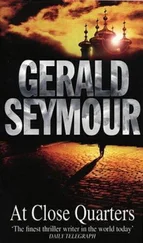Gerald Seymour - Kingfisher
Здесь есть возможность читать онлайн «Gerald Seymour - Kingfisher» весь текст электронной книги совершенно бесплатно (целиком полную версию без сокращений). В некоторых случаях можно слушать аудио, скачать через торрент в формате fb2 и присутствует краткое содержание. Жанр: Триллер, на английском языке. Описание произведения, (предисловие) а так же отзывы посетителей доступны на портале библиотеки ЛибКат.
- Название:Kingfisher
- Автор:
- Жанр:
- Год:неизвестен
- ISBN:нет данных
- Рейтинг книги:3 / 5. Голосов: 1
-
Избранное:Добавить в избранное
- Отзывы:
-
Ваша оценка:
- 60
- 1
- 2
- 3
- 4
- 5
Kingfisher: краткое содержание, описание и аннотация
Предлагаем к чтению аннотацию, описание, краткое содержание или предисловие (зависит от того, что написал сам автор книги «Kingfisher»). Если вы не нашли необходимую информацию о книге — напишите в комментариях, мы постараемся отыскать её.
Kingfisher — читать онлайн бесплатно полную книгу (весь текст) целиком
Ниже представлен текст книги, разбитый по страницам. Система сохранения места последней прочитанной страницы, позволяет с удобством читать онлайн бесплатно книгу «Kingfisher», без необходимости каждый раз заново искать на чём Вы остановились. Поставьте закладку, и сможете в любой момент перейти на страницу, на которой закончили чтение.
Интервал:
Закладка:
Rebecca stooped into her place, four rows in front, but not turning to see them, and then David lost sight of her as other passengers surged the length of the cabin in a steady clamour. It was what he had heard, that people always suffer stress before take-off and before landing; makes them raise their voices, and push aggressively in a way they would not contemplate if their feet were grounded. David fastened his seat belt and looked across at Isaac.
'Courage, my friend,' he said.
'Not courage. It is the time for luck now.' Isaac closed his eyes, waiting for the motion of the plane to tell him they were taxi-ing.
Five minutes they'd been in the house, time enough for them to recognize the stark terror on the faces of the father and mother of Moses Albyov before the truncheon in her lower abdomen and the pistol whipping across his face had delivered up the names of David and Isaac and Rebecca.
One policeman stayed in the living-room, covering with his drawn pistol the woman who cowered in the chair, clutching herself and moaning, and the man lying still on the floor with the blood running from the head wound on to the lino surface. Another had gone to his car to radio to headquarters the fruits of the visit Six more, packed close together, were speeding towards the home of the one called David, the one the woman had said she had gone to visit the morning before to ask the whereabouts of her son.
Some hundreds of yards short of David's address the driver of the police car silenced the siren he had used to clear a path through the traffic, and when they staggered to a halt, his foot hard on the brake pedal, there was a swift and often rehearsed routine for them to follow. Two running for the back, jumping the wire fence, then crouching low, their guns aimed at the rear door. Two more at the front, and behind the car, to give themselves cover. The remaining two, an officer and one who was brave, chancing their luck at the door. 'Shoot him if he has a gun. Without hesitation. Remember what Albyov did, and remember this is one of them.'
David's mother, alone in the house, answered the hammering at the door. Her younger children were still at school, her husband at work, so she was without protection as the officer forced her against the old wooden sideboard, his knee hard against her thigh so that the carved angle bit into her skin. There was no reason to hit: she talked without resort to violence. Too much for her, after a year in Treblinka and never called for the showers, no resistance left, not to a man in uniform who carried a gun, and who shouted and who wore boots that reached to his knee. She had submitted before and would do so again. She told them of her son's friends, pointed him out in the family photograph, said he hadn't been home the previous night.
At militia headquarters they believed in the power of routine. Three names, photographs that would illustrate them when the cars came in from the homes, and when Central Records turned up the files. All standard and routine. Just as it was routine to call the airport with the names, and the principal Aeroflot ticket offices, and to send descriptions to the railway station and the bus terminus by the square of the granite war memorial. All routes of exit from the city were notified with 'priority' messages. And because the computer of the central Aeroflot offices was repaired and functioning, that was the source of the first hard information. The message rattled back over the teleprinter – three names, three tickets, flight number, take-off time, destination. All this was controlled from the second floor operations centre of the militia headquarters – fast, quiet, efficient, a trained team that was good at its work, and which had discovered a scent, and believed that the kill was close.
A call to the airport, routed through the offices of the Frontier Guard control point, to the commander of the unit who had responsibility for all matters affecting security. A second call to the Control Tower.
'Aeroflot flight 927 to Tashkent has been airborne nine minutes, close to ten,' the Frontier Guard commander reported back to the Control Room. Verified by the tower.
'Then tell the control tower to radio the pilot, order him to return. Tell him the passengers should be informed there is a technical fault. When the plane lands I want every man you have around it. Nobody gets off, not till we arrive.'
'Do you want the pilot to be told that this is a security matter?'
'Why not?'
Down in the yard the black Moskva car had been alerted; it waited with its engine idling for the sprinting figure of the Colonel of Militia.
They were climbing in light cloud when Yuri Zibov, 18 years an Aeroflot pilot and most of them on the lumbering Ilyushin 11-18V, and before that Yak bombers in the Air Force, received the recall order. He motioned to his co-pilot – young, feminine, petite, a hint of lipstick, and as many flying qualifications as her male equivalents. Had she understood the message? A nod.
Zibov turned to the navigator sitting behind. He also had understood. Into the microphone that jutted out from his headset and that rested three-quarters of an inch from his mouth, he said, 'Bolt the cockpit door. Just a precaution, but fasten it, then we'll swing.'
The navigator started to intone the statistics that would govern their change of course.
David was groping with his arms into the recess of the shelf where he could not see. Even as he stretched upwards he was reliant on the touch of his fingers to tell him if the package were there.
Fumbling among the softness of the blankets and the pillows, scratching with his fingers and seeking for the hard shape. Not there, not above Row 19, and in a driving and frantic motion his hands spilled out to right and left, and he was high on his toes, and the passenger who had the seat beside him was staring, and was interested. Almost at the moment of panic David's hands locked on to the ungiving shape of the parcel. Must have slipped backwards on take-off, he thought.
Right over Row 20. He made a low- voiced apology to his neighbour, who was leaning back in his seat with his legs bent sideways to give David room. He lifted the package down, just as they had wrapped it, right down to the knots in the string: not tampered with. Tucking it under his arm he lurched his way through to the rear, to the bolted security of the lavatories, and a half-turn to be certain that Isaac was watching him; the gleam of recognition that told him Isaac was ready, coiled, anticipating. Had to push past the two stewardesses, blue uniforms, crumpled shirts, hair wisping from buns, minimum of make-up, preparing the food trolley and drinks. No alcohol on boardmineral water and orange juice and coffee, reluctant to step aside and let him pass, an obstruction when they were trying to work, seeming to say why couldn't he have gone in the terminal lavatories.
He slammed the door shut behind him and ran the catch across. Then he began to tear at the paper and the string binding, pulling at the cardboard that had given the parcel the rectangular shape, that had made Yevsei believe it was indeed a mass of books that he had handled. The parcel spilled open, pitching the hand-gun on to the floor beside the pan where he let it lie while he unravelled the further protection around the two submachine-guns. Lovely babies. Sweet, keen, pretty things, but already taking on the ugliness of their trade as the barrel symmetry was broken when he fastened the magazines at right angles to the bodies. One at a time and take it slowly, remember the drill with the old man, with Timofey. Never hurry in the preparation of weapons, he had said. The loud rasping of the cocking mechanism – devastating how the noise reverberated inside the confined space – then check the safety catch is on. Same for the pistol. No accidents, not in a capacity-filled airliner, not when the pressure of the cabin will soon be at risk.
Читать дальшеИнтервал:
Закладка:
Похожие книги на «Kingfisher»
Представляем Вашему вниманию похожие книги на «Kingfisher» списком для выбора. Мы отобрали схожую по названию и смыслу литературу в надежде предоставить читателям больше вариантов отыскать новые, интересные, ещё непрочитанные произведения.
Обсуждение, отзывы о книге «Kingfisher» и просто собственные мнения читателей. Оставьте ваши комментарии, напишите, что Вы думаете о произведении, его смысле или главных героях. Укажите что конкретно понравилось, а что нет, и почему Вы так считаете.












